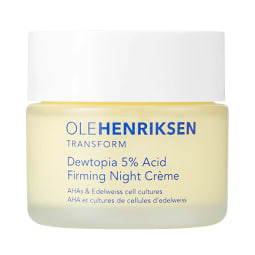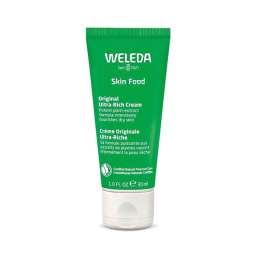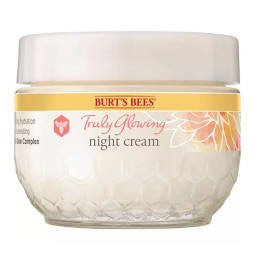Advertisement
The 12 Best Healthy Aging Night Creams According To The Pros + What To Look For


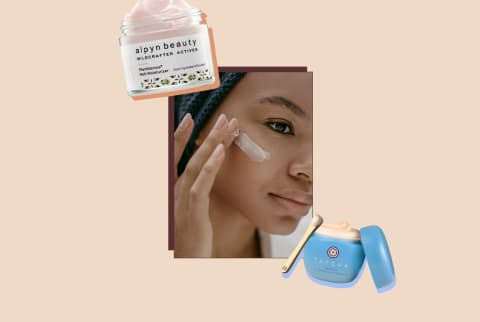
No matter what stage you are at in life, caring for your skin is valuable and worthwhile. It's not superficial to care about skin health. And as you age, you may notice your skin care routine needs tweaks and adjustments to account for changes in your skin. Just as you may adjust your diet or exercise habits as you get older or as your body changes, so should you change your skin care routine.
However, it's important to acknowledge that everyone's skin ages differently. This is due to genetics, lifestyle choices, environmental influences, and skin care habits. So when you set out to find a product to tend to your skin, it's important to find one that suits your individual needs.
How we picked:
Variety
Everyone's needs are different—in terms of budget, skin type, and concern. So we selected a wide range of products for you to browse.
Tested & recommended
The products on this list have either been tested by me, mbg staffers, contributors, or skin care experts we trust. We also looked at customer reviews, as we believe they can offer valuable insights.
Effective ingredients
There are many ingredients that can treat the various signs of aging. We selected formulas that used the most science-backed, effective actives.
Sensorial experience
You won't use products you don't enjoy. That's why we prioritize recommending creams that have quality textures—so they feel great when you apply.
Best anti-aging night creams
Best for oily skin: Glow Recipe Watermelon Glow AHA Night Treatment
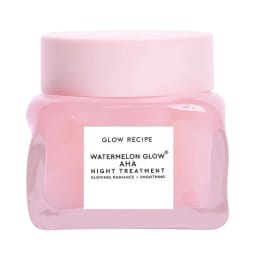
Pros
- Contains niacinamide, which also helps control breakouts
- Smells fresh & fruity
- Light texture
Cons
- Some may not tolerate nightly use
Ingredient considerations::
VeganCruelty freeAHAsNiacinamidePeptidesHyaluronic acidMoringa seed oilWatermelon extractApple fruit extractLentil fruit extractPropanediolSize(s):
2.02 FL OZ0.84 FL OZThis star-studded overnight cream will help exfoliate excess dead skin cells and debris, minimize the appearance of pores, help manage breakouts, and reduce shine—without stripping the skin. Here’s a rundown on how: The AHA complex is pH balanced, so it doesn’t disrupt the skin while it’s providing powerful exfoliation and deep clean of the pores. Niacinamide bolsters the skin barrier, while helping to control pimples. And seven (seven!) types of hyaluronic acid provide ample hydration to various levels of epidermis.
What users say:
Glow Recipe has built a cult following for its efficacious, yet fun, products. And this star formula is one of the fan favorites. One user comments on the non-greasy texture, which is a must for those with oil-prone skin: “Love this line of products and this one particularly. It’s not heavy and doesn’t make your face greasy like most night treatments.”
Best for sensitive skin: Tatcha Indigo Overnight Repair Serum in Cream Treatment
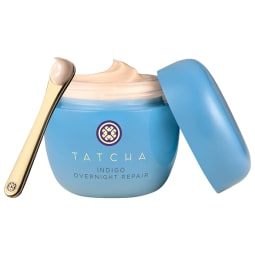
Pros
- Incredible rich texture
- Clinical studies show it supports barrier strength & wrinkle reduction
Cons
- Pricey
- Contains silicones if you avoid those
Ingredient considerations::
VeganCruelty freeHyaluronic acidJapanese indigo extractCeramidesMondo grass rootSize(s):
1.7 FL OZ0.34 FL OZThis thick cream supports the skin barrier structure and helps nurture the microbiome—making it ideal for those whose skin shows signs of irritation and inflammation (read: sensitive skin folk.) The Japanese indigo extract can visibly calm skin by hydrating dry patches and reducing redness. Ceramides and hyaluronic acid hydrate and bolster the barrier. Finally, the mondo grass root and fermented ingredients help balance the skin’s microbiome.
What users say:
A sign of success for any product is if it inspires repeat purchases. Well, one reviewer said she’s on her fourth bottle: “Let me tell you how amazing this product is for your dry, dehydrated skin. I’m on my fourth treatment and I absolutely love it!”
Advertisement
Best for over 50: Maya Chia The Advanced Response Complex Face + Neck Cream
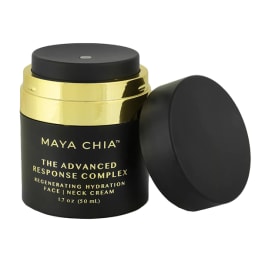
Pros
- Made for both the neck and face, so it targets two areas
- Packaging is refillable, which cuts down on materials long term
Cons
- Pricey
- Fragrance made with essential oils, so avoid if you're sensitive
Ingredient considerations::
VeganCruelty freePeptidesGreen tea extractFermented mineralsGrowth factorsChebulaAstaxanthinSize(s):
1.7 FL OZRefills"This is the time when you really begin to see collagen loss and saggy skin," holistic esthetician Elle Feldman once told us about aging during this decade. Skin care experts, beauty editors, and users alike adore this cream (it’s one of the top recommended creams I hear on my podcast). It works so well because it targets multiple signs of skin aging by using innovative, botanically based ingredients. The most impressive is the plant transforming growth factor beta-2 (plant-TGFβ2), to help skin regenerate at the cellular level. It also uses peptides to hydrate and improve the appearance of fine lines, amino acids for collagen support, and two very powerful antioxidants (astaxanthin and chebula) to neutralize free radical damage.
What users say:
As with any skin care product, it’s good to give it at least a few weeks to see full results, but users are surprised at how fast it works. Says one who has been using it for two weeks, “I notice a difference in the tone and texture of my skin. My skin is visibly firmer with reduced hyperpigmentation. My neck and face feel smoother.”
Best for acne prone skin: Naturium Encapsulated Salicylic Acid Moisturizer
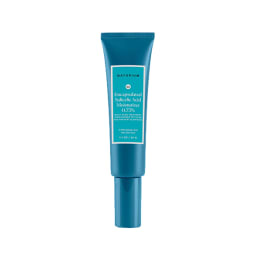
Pros
- Affordable price point
- Works for sensitive skin that’s also acne-prone
Cons
- Great for mild to medium acne, but not strong enough for severe cases
Ingredient considerations::
Cruelty freeNiacinamideSalicylic acidSize(s):
1.7 FL OZSalicylic acid is one of the best known ingredients to treat and target acne. The chemical exfoliant targets oils and lipids, so it dissolves sebum and breaks down skin cell membranes (which can help excess dead skin cells shed faster). This moisturizer uses an encapsulated version at 0.75%, which is potent enough to target breakouts, while also being gentle enough for more sensitive skin types. The hydrator also uses niacinamide for blemish control and barrier support.
What users say:
Treating acne is complicated, as the skin condition has multiple influencing factors. So you should never rely on one product to do all the work. (It usually takes a whole routine, plus lifestyle habits such as stress management and nutrition!) However, one user noted, “the salicylic acid helps to keep any of the acne producing oils to a minimum. This, combined with the acne spot treatment are a great acne fighting combination to keep your face and skin free from acne!”
Advertisement
Best for dry skin: Kiehl’s Midnight Recovery Omega Rich Botanical Night Cream
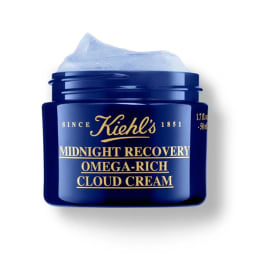
Pros
- Uses 50% post-consumer recycled jar & manufactured using 100% renewable energy sources
- Contains sustainably sourced shea butter and essential oils
Cons
- A bit thick for use during the day or under makeup
Ingredient considerations::
SqualaneOmega fatty acidsEvening primrose oilSize(s):
1.7 FL OZA texture so dreamy and cloud-like, you’ll look forward to applying as part of your wind-down ritual. The blend uses antioxidant-rich botanical oils (like rosemary, primrose and lavender oils), shea butter, squalane, and omega fatty acids to provide your skin deep hydration that lasts. The omega fatty acids in particular replenish and repair your skin’s moisture barrier, so your skin is better able to hold in hydration throughout the night (when transepidermal water loss is most common.)
What users say:
The texture of this cream must be experienced—users simply rave about it: “I can't tell you the difference this cream made in my skincare routine! It's been a nightly indulgence. My skin looks and feels amazing.”
Best with retinol: Dr. Dennis Gross Advanced Retinol Ferulic Intense Wrinkle Cream
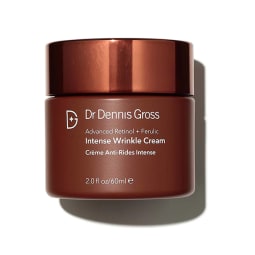
Pros
- Easier to tolerate than retinol serums
- Thick, hydrating texture
Cons
- Pricey
Ingredient considerations::
VeganCruelty freeHyaluronic acidApple fruit extractSqualaneEvening primrose oilEncapsulated retinolBakuchiolFerulic acidRambutanCentella asiaticaSize(s):
2.02 FL OZWhile retinol is most often used as a treatment step (i.e. as a serum or gel to be used immediately after washing, and before the moisturizer), some folks prefer to fold the ingredient into their creams in order to condense steps. There’s an added bonus to doing this: It often is easier on the skin, since creams are made with hydrators and emulsifiers to buffer any irritating side effects. This option is the top of the line as far as retinol creams go: It’s made with an encapsulated retinol, plant-based bakuchiol, and the antioxidants ferulic acid and rambutan. In combination these reduce hyperpigmentation, ease fine lines, and help build collagen overtime.
What users say:
mindbodygreen beauty writer Emily Rekstis speaks highly of this cream, writing: “The embodiment of a retinol cream, this buttery moisturizer is formulated with hydrating antioxidants like centella asiatica alongside anti-aging powerhouses retinol and bakuchiol.” Another user agrees, saying: “I've bought 3 times. It's the best!.”
Advertisement
Pros
- Reduces the look of clogged pores and blackheads
Cons
- Contains essential oils if you’re sensitive to those
Ingredient considerations::
VeganCruelty freeAHAsEdelweiss stem cellSize(s):
1.7 FL OZThose with combination skin know how challenging finding a good nighttime product is. Too thick and occlusive, and it’s a recipe for congested skin come morning. Too thin or stripping, and the drier areas of skin will be parched. This option meets skin in the middle. The AHA blend (it’s made with glycolic and lactic acids) provides a gentle exfoliation, while the Edelweiss stem cells firm skin and strengthen the barrier. And the base is a super hydrating mix of shea butter and botanical extracts to further provide moisture.
What users say:
It’s a transformative night cream, reviewers note: “I wake up with plump, moisturized skin and it feels so soft. It absorbs pretty quickly and doesn’t leave any residue or sticky feeling.”
Pros
- Affordable
- Multitasking (can use it on your hands and feet!)
Cons
- Contains essential oils if you’re sensitive to those
- Not vegan due to the beeswax
Ingredient considerations::
Cruelty freeChamomileBeeswaxSize(s):
1.0 FL OZ2.5 FL OZThis beloved multipurpose cream can double as a very thick nighttime treatment—in fact, it’s the secret weapon for many natural skin care experts (like myself!). While I wouldn’t recommend this for acne-prone skin, for those on the drier side this will provide intense hydration and stop transepidermal water loss at night. (It’s similar to slugging.) Plus it’s made with calming botanicals such as calendula and chamomile.
What users say:
Don’t take my word for it, everyday users swear by using this as a face cream, too: “My must have. Tiny bit of it rescues the skin. Sometimes, I put it on after [my] serum at night to seal everything in, when my skin needs extra nourishment.”
Advertisement
Best repairing cream: First Aid Beauty Ultra Repair Hydra-Firm Night Cream
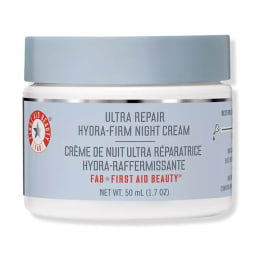
Pros
- Colloidal oatmeal is shown to reduce inflammation in the skin
Cons
- Some complains of a greasy film after using
Ingredient considerations::
VeganCruelty freeNiacinamideColloidal oatmealSize(s):
1.7 FL OZFor easily irritated and sensitized skin that needs a restart, this barrier cream will provide soothing comfort ASAP. The star ingredient is colloidal oatmeal, which is dermatologist go-to for repairing skin and easing inflammation. It also contains niacinamide for skin barrier support and hyaluronic acid to attract and hold moisture. A not so small side effect to look forward to: The formula firms and lifts skin in the process.
What users say:
Not only is it densely hydrating, folks with inflammatory skin conditions (like rosacea) have noted it helps heal their skin: “My face looks very nourished after using this cream at night. I also have rosacea and this does wonders to minimize the red blotches my cheeks occasionally experience.”
Best brightening : Alpyn Beauty Plantgenius Melt Moisturizer
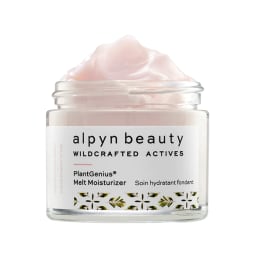
Pros
- The brand supports 1% For the Planet, where a portion of every purchase goes directly to forest restoration efforts.
Cons
- May not be suitable for very sensitive skin
Ingredient considerations::
VeganCruelty freeHyaluronic acidSqualaneBakuchiolCeramidesSize(s):
1.7 FL OZ0.5 FL OZWho doesn’t want to wake up with brighter, more vibrant skin? Well this bakuchiol infused face cream will get you there. The ingredient works to improve skin cell turnover and fade discoloration and dullness. It also includes the brightening antioxidant Vitamin C, as well as squalane, ceramides and hyaluronic acid for hydration support—a must for glowing skin. And not for nothing, but it also has an incredible texture: It’s called “melt moisturizer” because it feels like it’s melting into the skin.
What users say:
The texture of this product inspires rave reviews, like this one: “It is lightweight, and like the name says it melts into my skin leaving smooth, hydrated, and glowing skin!”
Advertisement
Best antioxidant cream: True Botanicals Renew Chebula Extreme Cream
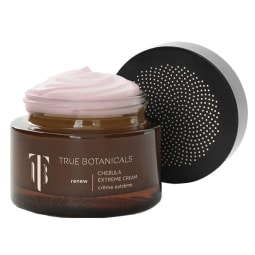
Pros
- A super robust formula where most of the ingredients have antioxidant properties
Cons
- Very pricey
Ingredient considerations::
VeganCruelty freeHyaluronic acidMoringa seed oilGreen tea extractChebulaSize(s):
1.7 FL OZChebula is a powerful antioxidant that addresses multiple signs of aging skin, from fine lines to dullness. But it doesn’t stop there, the formula contains several super botanical extracts that are antioxidants: aloe, green tea, and acerola cherry, just to name a few. This is all infused in a buttery base made with mango seed butter and several botanical oils. They also have a serum version of the cream, which is a personal favorite of mine (I’m rarely without a bottle).
What users say:
If this all sounds too good to be true, reviewers say that the results back up the claims: “I am always a bit skeptical about the effects of moisturizers. But this cream is remarkable.”
Pros
- 98.9% natural origin ingredients
- Benefits all skin types
Cons
- Not vegan due to beeswax
Ingredient considerations::
Cruelty freeHyaluronic acidSqualaneBeeswaxProteinsSize(s):
1.8 FL OZThis dermatologist tested and designed night cream offers glowing results at a reasonable price point. The blend uses botanical oils (such as jojoba and safflower), as well as mango seed butter to offer intense hydration. There’s also hyaluronic acid to pull in and hold water, as well as squalane to support the skin barrier.
What users say:
Night creams tend to be costly, but with this formula you can wake up with vibrant skin on a budget: “When I woke up the next morning I was in love with how much better my face felt.”
How to choose.
No matter how well formulated a face cream is, it's not worth your time or money if it's not addressing your unique skin care needs and goals. Don't just buy something because an influencer, celebrity, or even beauty reporter (hi!) says you need it. If you think critically about what you're actually looking for in a skin care product, then you'll have much better luck. Here, a few things to consider when browsing for a new night cream:
Skin type.
While I believe that "skin types" aren't as cut-and-dried as we make them out to be, the classifications can be useful tools to help sift through the saturated skin care market. For example, you probably know where you fall on the "dry to oily" spectrum—or if you're blemish-prone, easily irritated, or naturally sensitive.
While these categories can all overlap a bit (you can be both acne-prone and sensitive, for example), they can at least help you eliminate options that you know won't work for you. So if you're dry, you know that you probably shouldn't find a night cream with a high concentration of physical exfoliants. Or if you're sensitive, you may want to avoid irritating ingredients, such as essential oils, salicylic acid, and even strong retinols.
Knowing your skin's baseline is a vital first step in finding a formula for you.
Goals.
Once you understand where you're at, you can start thinking about what you want. We all have different priorities with our complexions, but a few of the more common ones we hear are:
- Brightness (i.e., correcting dullness)
- Firmness (i.e., supporting collagen)
- Smoothing (i.e., addressing texture concerns)
- Fine line reduction
- Hydration
- Clearing blemishes
- Reducing shine
- Barrier repair (i.e., addressing irritation and inflammation)
Once you have an idea of your needs, you should look for products designed to address them. I know this sounds like an obvious tip, but all to often folks get talked into products that may not be as effective at targeting their priorities.
Personal ingredient sensitivities or other considerations.
We all have unique sensitivities, and if you know that your skin reacts to essential oils, you should find a product that steers clear of them. This does mean you'll need to be diligent about reading the ingredient list, but it's a small price to pay for happy skin. But there might be other personal considerations that are important to you, such as adhering to a vegan lifestyle or using eco-friendly products. Again, these will require a bit more diligence when shopping, but luckily brands are now much more transparent with their sustainability practices and ingredients.
Sensorial appeal.
You won't use a product if you don't like it. If the texture isn't right or you hate the smell, it just doesn't matter how effective the ingredients are. Ultimately, this will require a bit of guess and test.
The best dermatologist-approved healthy aging ingredients.
It's always a good idea to familiarize yourself with common ingredients. Here, a few of the best derm-approved options:
- Retinol: Perhaps the most famous ingredient for aging skin, retinol is considered the "gold standard" by dermatologists. "Besides stimulating production of new collagen, retinol enhances cell turnover," says board-certified dermatologist Joshua Zeichner, M.D. "This means it sheds dead and damaged cells that make the skin look dull."
- AHAs/BHAs: These are chemical exfoliants that can help improve skin texture, reduce excess oil, improve tone, and ease fine lines. In particular for aging skin, glycolic acids (an AHA) have been shown to increase collagen production1; however, salicylic acid (a BHA) is better for acne-prone skin. If you're unsure which type to turn to, AHAs are a safer bet. "They can be simultaneously exfoliating and hydrating, making them very beneficial to many skin types," says board-certified dermatologist Mona Gohara, M.D.
- Vitamin C: This vitamin is an essential part of the collagen synthesis process, making it a valuable antioxidant to help improve firmness and decrease fine lines.
- Antioxidants: There are many topical antioxidants to choose from. In general, they help protect the collagen layer, fight free radical damage, and can improve overall tone. "People often ask how many antioxidants you should be using regularly; the answer is: the more the better," says board-certified dermatologist Rachel Nazarian, M.D., of Schweiger Dermatology Group. "The more you can help neutralize unstable molecules caused by free radical formation, the longer you can salvage the health of your cells and skin. There's really no limit to how much you can protect and repair your body!" Check out our favorites here.
- Ceramides. Ceramides are excellent emollients that support the skin barrier and offer hydration.
- Peptides. While these are a newer area of research, peptides are promising ingredients for a host of benefits, such as collagen production and fine line reduction. "In vitro studies as well as some clinical data suggest that certain peptides2 have properties of inhibiting aging-related enzymes in the connective tissues of our skin that break down the collagen, elastin, and hyaluronic acid, which can be very helpful in preventing and treating aging-related signs," says Nava Greenfield, M.D., board-certified dermatologist at Schweiger Dermatology Group in New York City.
- Humectants. Humectants, like the famous hyaluronic acid, attract and hold water. This can not only aid in hydration but can offer a temporary plumping and smoothing effect for the skin.
FAQ
What is the difference between anti-aging cream and night cream?
The difference between anti-aging creams and night creams is just the intended use (and honestly, a little bit of marketing). An anti-aging cream's purpose is to target signs of premature or aging skin. A night cream's purpose is to limit transepidermal water loss and work synergistically with your skin while you sleep in order to get maximum skin benefits. However, an anti-aging cream can also be a night cream, and vice versa.
What is the best skin care routine for aging skin?
Every skin type, concern, and goal is unique; therefore, the "best" skin care routine will look slightly different for everyone. However, a good basis to follow is: a gentle cleanser, a treatment serum that addresses your personal goal (such as hydration, vibrancy, or firmness), and a moisturizer that suits your texture preference. During the day always wear sunscreen, and at night you should use a thicker cream or oil to boost hydration. While these are the basics, there are a few additional steps you can add in: toner, eye cream, weekly masks, or peels.
Which is better, night cream or serum?
Both night creams and serums can be beneficial for skin—and in fact, they can often be used together! Serums typically contain active ingredients at higher concentrations so they are considered the "treatment" step in the routine. While they can contain hydrating ingredients, moisturization is not their primary function. That's where creams come in: Creams (day or night) provide hydration and support the skin barrier. These can also contain active ingredients (such as vitamin C or retinol), but their intended purpose is to moisturize.
The takeaway.
For glowing, vibrant skin, let your skin care do the hard work for you while you sleep with a night cream that targets your specific aging needs. If you want more advice on optimizing your beauty sleep, check out our guide to skin care at night.
